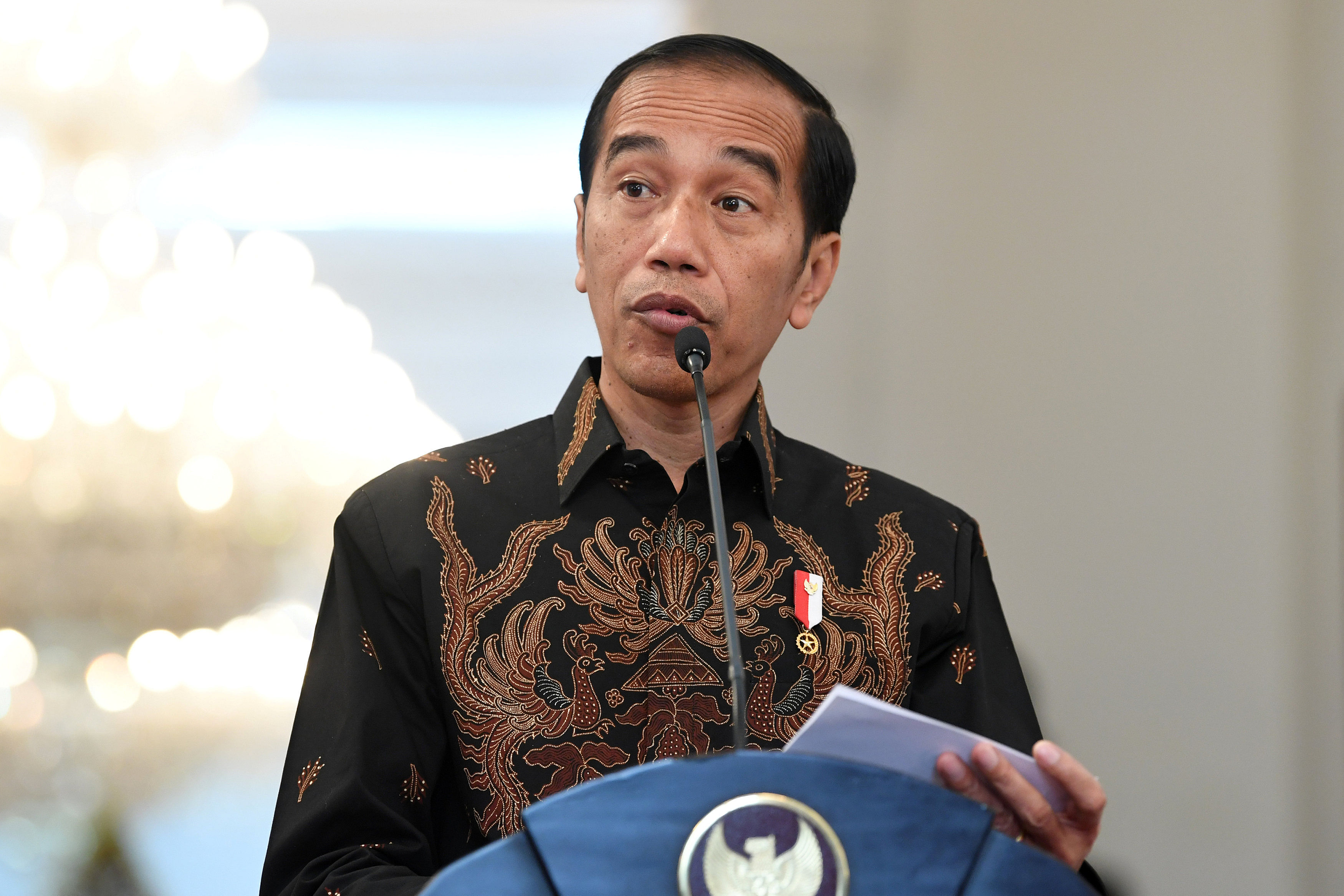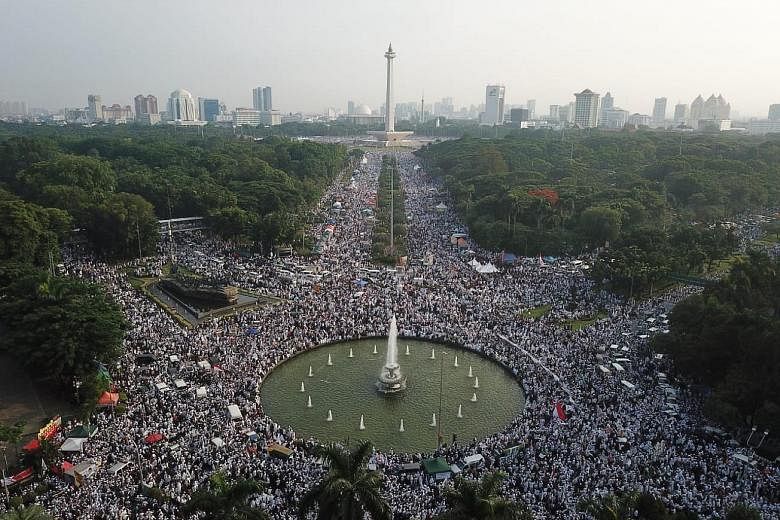There was a sense of deja vu last Sunday when hundreds of thousands of Muslims took to the streets of Jakarta to mark the second anniversary of a mass protest in 2016 against then-governor Basuki Tjahaja Purnama for insulting Islam.
The inaugural Aksi 212 protest - the numbers refer to the date of the first rally held on Dec 2 two years ago - was an unprecedented event that shocked the world.
It was a chilling sight as the main thoroughfares of the capital were over-run by protesters calling for the head of the Chinese-Christian politician best known as Ahok.
What unfolded at last Sunday's reunion rally was reminiscent of the familiar spectre of identity politics, which many had feared will rear its ugly head again in Indonesia ahead of another big election year in 2019.
The protest in 2016 not only led to the fall of a popular minority figure in Indonesian politics but also resulted in fresh sectarian strife across a country with the world's largest Muslim population.
For proponents of a secular Indonesia, it was a day of reckoning, as a wave of religiosity hit its peak and threatened the country's founding principle of Bhinneka Tunggal Ika, or unity in diversity.
Still fresh in the minds of many today was how the first 212 protest gave momentum to the anti-Ahok movement, which culminated with his defeat in a racially charged gubernatorial election in 2017 and his subsequent conviction for blasphemy shortly after the polls.

Pressure from local hardline groups such as the Islamic Defenders Front (FPI), which spearheaded the movement against Basuki, also contributed to his downfall.
Since then, cases of religious intolerance in Indonesia recorded by local think-tank Setara Institute have been on the rise, reaching 270 last year, up from 177 cases in 2014.

Just last month, an opposition politician filed a police report against Ms Grace Natalie, the Chinese-Christian leader of the Indonesian Solidarity Party, after she announced a plan to oppose any syariah-based by-laws if elected next year. That the turnout for the second anniversary of Aksi 212 was reportedly larger than the original protest did little to assuage concerns that Islamist groups, such as the FPI, were mobilising again.
While the reunion was widely lauded as being relatively peaceful, the rhetoric from participants was no less raucous, particularly against President Joko Widodo, who is running for re-election against his rival from 2014, Mr Prabowo Subianto.
In a veiled attack on Mr Joko, protesters at the Sunday rally called for Muslims to refrain from voting for candidates aligned with Basuki. They also chanted "Ganti Presiden", a slogan that started out as part of a "black campaign" online calling for the removal of Mr Joko.
The 212 crowd was undoubtedly taking their cue from FPI leader Rizieq Shihab, who is currently in self-exile.
Addressing protesters at the reunion by phone from Saudi Arabia, the firebrand cleric said it is haram, or forbidden by Islamic law, to vote for candidates such as Mr Joko, who stood with Basuki, "a blasphemer".
Not surprisingly, Mr Joko, who goes by his popular moniker Jokowi, as well as his running mate Ma'ruf Amin, were not invited to Sunday's rally. This, even though Dr Ma'ruf is a venerable cleric, and once an influential figure among the 212 activists and other conservatives.
In their absence, Mr Prabowo and other opponents of the President inevitably became the headliners at the Aksi 212 reunion.
The partisan nature of the event was not lost on many people, including political observers such as Professor Syamsuddin Haris from the Indonesian Institute of Sciences.
"The intensification of identity politics is a global phenomenon, including here in Indonesia," said Dr Syamsuddin. "The problem is that the 212 movement supports the political interests of just one of the (presidential) candidates."
Although Basuki's name is not on the ballot in 2019, anti-Ahok sentiment still looms large among 212 activists intent on playing up the sectarian card against Mr Joko and those with ties to the President or his coalition.
But ISEAS-Yusof Ishak Institute fellow Norshahril Saat said that while there is little doubt over the ability of Islamist groups to rally the masses, the true impact of last Sunday's reunion remains to be seen.
"The reason why the protest was less vociferous was because of two factors: First, there is a lack of ideology underlying the protest - there is no longer a clear purpose, for example, to take down Ahok in 2016," Dr Norshahril told The Straits Times.
"Second, the original organisers behind the 212 movement are divided between Jokowi and Prabowo. Even Ma'ruf Amin has distanced himself from the 212 reunion."
Dr Syamsuddin agrees, adding that the 212 actors may be hoping for a repeat of what happened with the Jakarta election. "But I don't think it will work this time because the context is different - Ahok is Christian, Jokowi is Muslim."
To their credit, Mr Prabowo and his running mate Sandiaga Uno have chosen to focus on economic policy matters rather than race, religion or other more divisive issues on the campaign trail.
A key plank of their "Fair and Prosperous Indonesia" election platform is also to advocate harmony among citizens regardless of their race, religion, and social standing.
However, the rise of religious intolerance in Indonesia over the last decade has increased the appeal and effectiveness of using identity politics to win elections, as the fall of Basuki has shown.
Indeed, experts like Dr Norshahril believe that in an election year, various groups will still try to exploit populist sentiment, especially religious issues, for political gain in the months ahead.
The question is whether Indonesian voters will succumb to identity politics and let what is essentially an extreme, right-wing agenda hijack next year's national elections.
Or will political tribalism in Indonesia finally give way to more inclusive politics, and allow the country to live up to its status as the world's third-largest democracy?


